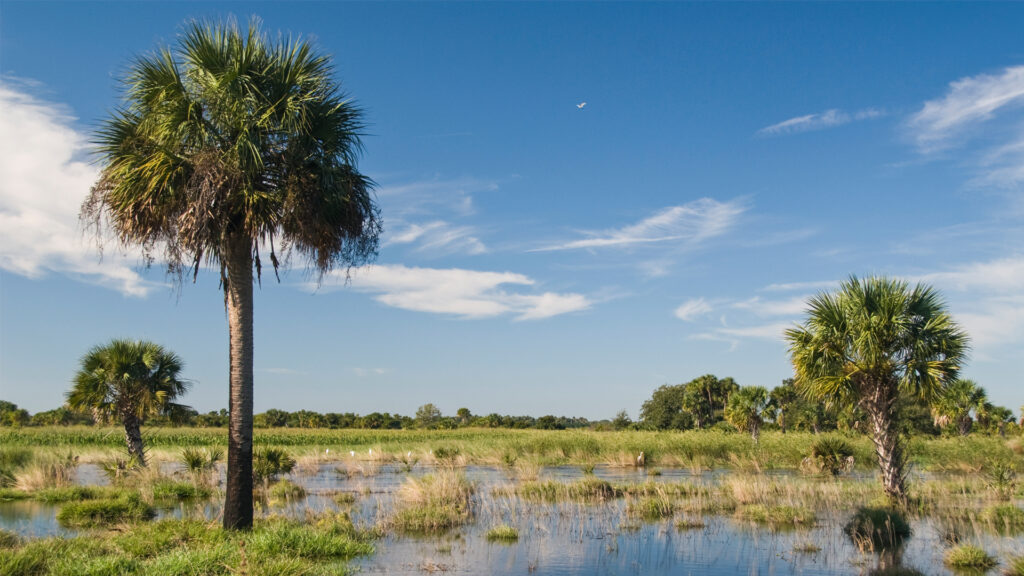By Rachel Rhode and Adam Gold, Environmental Defense Fund
Between the picturesque beaches and clear blue coastlines lies a different type of Florida — a Florida full of muddy swamps, unruly grasses, countless birds and alligators lurking nearby. Much of the state is made up of wetlands, an essential ecosystem that provides vital wildlife habitat, flood protection and economic benefits.

But in 2023, Florida’s wetlands lost a layer of protection. A Supreme Court decision drastically scaled back federal protections under the Clean Water Act, now only protecting wetlands with a “continuous surface connection” to federal waters.
This approach is not grounded in science and it’s uncertain how it will be interpreted in the long term, especially as surface water levels on wetlands can vary throughout the year. Despite the confusion, one thing is clear: We need to advocate for strong wetland protections. We need to do this at the federal level and support state agencies that now have more responsibility to prevent wetland degradation.
A new preliminary analysis released by Environmental Defense Fund estimates that 1.5 to 9.5 million acres of Florida wetlands are at risk of losing federal protection, a wide range that underscores the uncertainty of the court’s language. To put that in perspective, it could mean almost a quarter of the entire state may be at greater risk of pollution or development. Florida has broad state-level protections in place, but now, the Supreme Court ruling adds another curveball to how wetlands are protected in the state and puts a greater burden on state agencies.

There’s a lot at stake if we degrade and destroy wetland habitat. In the U.S. alone, wetlands are home to 7,000 types of plants, and almost half of federally threatened and endangered species rely on this ecosystem to survive. Not to mention, up to half of North American birds nest or feed in wetlands — think the roseate spoonbill or the great blue heron — bright, colorful birds that are beloved by Florida residents and visitors alike.
Wetlands also protect communities thanks to their innate ability to absorb and slow floodwaters. Sea levels are rising, rain patterns are changing and natural disasters are increasing and worsening in severity. This all points to more flooding, the costliest natural hazard in the United States. More than one third of Florida properties already risk severe flooding in the next 30 years – and just imagine what could happen if we take away nature’s most trusted flood buffer.
Additionally, wetlands help fuel local economies. Roughly 75% of the country’s commercially harvested fish and shellfish species come from wetlands, supporting fish production businesses. Wetlands also contribute to local tourism, an important industry in Florida that contributed $121.5 billion to the state’s economy and supported 2 million jobs in 2022.

It’s been almost one year since the Supreme Court rolled back on federal protections and we are already seeing the impact in multiple places across the U.S. that have weak or no state protections. We need lasting, clear and strong federal protections. Florida also has a chance to demonstrate its leadership in wetland protections by continuing to support broad state-level protections already in place, but this will require even more focus and investment in Florida’s Department of Environmental Protection, which is responsible for managing these safeguards.
Florida’s wetlands depend on the decisions we make today and it’s up to us to advocate for a future where people and nature can thrive together.
Rachel Rhode is a manager for Environmental Defense Fund’s Climate Resilient Coasts and Watersheds program in Florida. Adam Gold, Ph.D., is a scientist and manager for Environmental Defense Fund’s Climate Resilient Coasts and Watersheds program. Adam is leading the first preliminary analysis of at-risk wetlands post Sackett v. EPA. For more information on Environmental Defense Fund’s efforts to protect wetlands, visit edf.org/wetlands.
If you are interested in submitting an opinion piece to The Invading Sea, email Editor Nathan Crabbe at ncrabbe@fau.edu. Sign up for The Invading Sea newsletter by visiting here.



